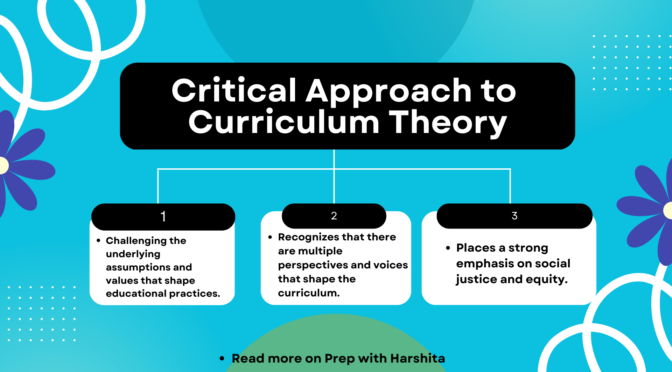A critical approach to curriculum theory is rooted in the idea that education is not neutral but rather a reflection of societal values and power dynamics.
It recognizes that the curriculum is not just a set of objectives, but rather a product of political, economic, and social forces.
In this, there is a focus on understanding and challenging the underlying assumptions and values that shape educational practices. This approach emphasizes the importance of examining how power operates within education. Also, the impact it has on students and society.
One key aspect of this approach is the recognition that there are multiple perspectives and voices that shape the curriculum. For example, the curriculum may be influenced by the beliefs and values of educators, administrators, politicians, parents, and other stakeholders. A critical approach seeks to understand these perspectives and how they impact the curriculum.
Another important aspect of a critical approach to curriculum theory is the focus on social justice and equity. This approach recognizes that education can be a tool for social change and that the curriculum can either reinforce or challenge existing power structures. Therefore, it is essential to examine how the curriculum can promote equity and social justice for all students.
A critical approach to curriculum theory has several key features, including:
- Social Context: It acknowledges that education is a social practice and that the curriculum is shaped by the social, economic, and political contexts in which it is developed and implemented. It recognizes that educational practices are not neutral, but rather reflect and reinforce societal values and power relations.
- Multiple Perspectives: A critical approach recognizes that there are multiple perspectives and voices that shape the curriculum. It emphasizes the importance of including diverse perspectives, such as those of students, parents, and community members, in curriculum development and implementation.
- Power Dynamics: A critical approach to curriculum theory is concerned with the ways in which power operates within education. It seeks to uncover and challenge the power relations that exist within educational institutions and curriculum development processes. This includes examining the ways in which certain groups, such as students from marginalized communities, are marginalized within the curriculum.
- Social Justice and Equity: A critical approach to curriculum theory places a strong emphasis on social justice and equity. It recognizes that education can be used as a tool for social change and that the curriculum can either reinforce or challenge existing power structures. Therefore, it is essential to examine how the curriculum can promote equity and social justice for all students.
- Reflection and Dialogue: It emphasizes the importance of ongoing reflection and dialogue. It encourages educators to critically examine their own beliefs and practices. Also to engage in dialogue with students, colleagues, and the wider community. This includes engaging in critical reflection on the curriculum and its impact on students and society.
Overall, this approach seeks to challenge existing power structures and promote social justice and equity through an examination of the social, economic, and political contexts in which education takes place. It recognizes the importance of multiple perspectives and ongoing reflection and dialogue in curriculum development and implementation.
Also Read: Learner-Driven Approach



Your notes are ‘ to the point,concise and related to the content
Thank you for your sharing. I am worried that I lack creative ideas. It is your article that makes me full of hope. Thank you. But, I have a question, can you help me?